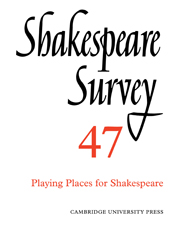Book contents
- Frontmatter
- Shakespeare Played Small: Three Speculations about the Body
- The Architecture of the Fortune Playhouse
- The Bare Island
- ‘How Chances it they Travel?’ Provincial Touring, Playing Places, and the King’s Men
- Writing for the Metropolis: Illegitimate Performances of Shakespeare in Early Nineteenth-Century London
- The Perishable Body of the Unpoetic: A. C. Bradley Performs Othello
- Playing Places for Shakespeare: The Maddermarket Theatre, Norwich
- ‘A Fairly Average Sort of Place’: Shakespeare in Northampton, 1927–1987
- The Living Monument: Self and Stage in the Criticism and Scholarship of M. C. Bradbrook
- Stratford Stages: Interviews with Michael Reardon and Tim Furby, and Sam Mendes
- Dis-Covering the Female Body: Erotic Exploration in Elizabethan Poetry
- Theseus’ Shadows in A Midsummer Night’s Dream
- ‘Time for Such a Word’: Verbal Echoing in Macbeth
- Shakespeare’s Knowledge of Italian
- Tamburline and Edward Alleyn’s Ring
- Shakespeare Performances in England, 1992–1993
- Professional Shakespeare Productions in the British Isles, January-December 1992
- The Year's Contributions to Shakespeare Studies 1 Critical Studies
- 2 Shakespeare’s Life, Times, and Stage
- 3 Editions and Textual Studies
- Books Received
- Index
Shakespeare’s Knowledge of Italian
Published online by Cambridge University Press: 28 March 2007
- Frontmatter
- Shakespeare Played Small: Three Speculations about the Body
- The Architecture of the Fortune Playhouse
- The Bare Island
- ‘How Chances it they Travel?’ Provincial Touring, Playing Places, and the King’s Men
- Writing for the Metropolis: Illegitimate Performances of Shakespeare in Early Nineteenth-Century London
- The Perishable Body of the Unpoetic: A. C. Bradley Performs Othello
- Playing Places for Shakespeare: The Maddermarket Theatre, Norwich
- ‘A Fairly Average Sort of Place’: Shakespeare in Northampton, 1927–1987
- The Living Monument: Self and Stage in the Criticism and Scholarship of M. C. Bradbrook
- Stratford Stages: Interviews with Michael Reardon and Tim Furby, and Sam Mendes
- Dis-Covering the Female Body: Erotic Exploration in Elizabethan Poetry
- Theseus’ Shadows in A Midsummer Night’s Dream
- ‘Time for Such a Word’: Verbal Echoing in Macbeth
- Shakespeare’s Knowledge of Italian
- Tamburline and Edward Alleyn’s Ring
- Shakespeare Performances in England, 1992–1993
- Professional Shakespeare Productions in the British Isles, January-December 1992
- The Year's Contributions to Shakespeare Studies 1 Critical Studies
- 2 Shakespeare’s Life, Times, and Stage
- 3 Editions and Textual Studies
- Books Received
- Index
Summary
The question of whether Shakespeare could read Italian remains uncertain although the plots of many of his plays were based on Italian sources. Othello, The Merchant of Venice, and Measure for Measure were based either wholly or in part on Italian narratives written by Cinthio, Bandello, Ser Giovanni Fiorentino and others. Twelfth Night and The Merry Wives of Windsor were heavily indebted to the anonymous Italian play Gl' Ingannati and Ser Giovanni Fiorentino's Il Pecorone. Many other Italian sources were used to a lesser extent in other plays.
Did Shakespeare read these sources in Italian, or did he have to rely on English and French translations of these works? Nothing certain is known. The claim that Shakespeare's knowledge of Latin enabled him to read Italian cannot be supported. The differences in the two languages are so great that even one versed in classical Latin cannot necessarily read Italian. For Shakespeare to have known Italian so as to be able to read the novelle of Cinthio and Bandello, he would have had to make some study of Italian as a separate language.
John Florio, well known in London's intellectual circles and Italian tutor in Southampton's household, published two Italian- English manuals, Firste Fruites in 1578, and Second Frvtes in 1591 (STC 11096-7). These were manuals of polite conversation as well as textbooks for teaching Italian to .Englishmen and English to Italians. They also come within the courtesy book tradition with their discussions of fencing, tennis, polite conversation, hunting, hawking, and other activities suitable for a gentleman.
- Type
- Chapter
- Information
- Shakespeare Survey , pp. 161 - 170Publisher: Cambridge University PressPrint publication year: 1994
- 4
- Cited by

